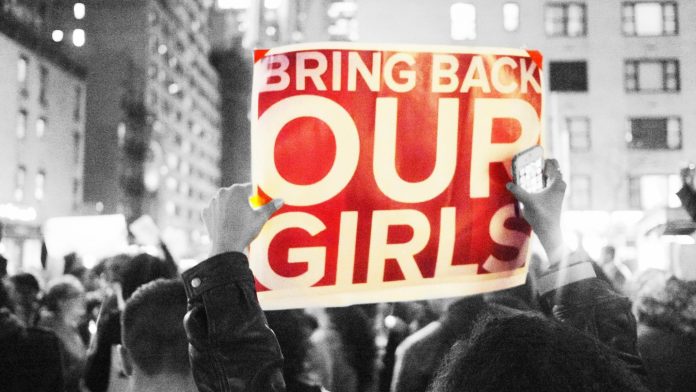The devastating story of the Chibok girls is no less tragic today than it was last year or the year before. In 2014, 276 girls’ lives were changed forever when they were ripped from their beds at the Government Girls Secondary School in Chibok, Borno state in north-eastern Nigeria. They had committed no crime. They were from poor households, they were girls, and they sought an education.
The tragedy of Chibok is a testament to the failure of the ruling class’ state to protect poor people. The girls were kidnapped under the watch of Goodluck Jonathon and the People’s Democratic Party, but 112 remain captive under over six years of Buhari’s All Progressive Congress (APC). The two ruling parties are united in their disdain for the Nigerian people and the callousness with which they treat the lives of the millions of poor Nigerians, who they rob daily to enrich themselves.
The tragedy of Chibok also tells us about the state of the girl child and women in Nigeria. Gender based violence has steadily been on the rise. Yet perpetrators, even when known, are rarely brought to justice. Crimes against women, in all their heinousness are joked about and displayed in cruel social media videos to the point where the society is numb to the violence which is the daily life of a Nigerian girl and women.
The Chibok girls have endured rape, forced marriage, and made to bear and raise the children of their torturers. Even the worst of us would never wish this plight to our worst enemy. Yet as the years go by and the chances of their return dim, their decadent reality remains unseen to the world.
The tragedy of the Chibok girls represents the poverty and backwardness of public education in Northern Nigeria. The region has the highest poverty rates, and some of the lowest literacy rates in the country as well. This worrisome phenomenon has been entrenched by the ruling class of the North over the last sixty years of flag independence.
An impoverished population without adequate education is disempowered, undermining their capacity to advocate for themselves. This makes them easily fall victim to a plundering class which holds them in low esteem. Nigeria’s over 70% poverty rate is exacerbated in the North. The Chibok girls and their parents dreamed of bursting through this harsh reality by going to school, but today, seven years later, they must look back only with a deep sense of grief and regret.
As socialists, we must examine the entire system of imperialism which negates the rights of human beings for dignity and wellness. A capitalist class is a self-absorbed machine that squeezes every last breath of life it can get away with from the poor to ensure its own survival. The Chibok parents did not have much, but they had a dream for their children which remains largely unfulfilled.
As we demand that government reports on the status of the remaining girls, we continue to fight for revolutionary democratic transformation of society. This class of plunderers who cannot guarantee the safety and security of the Chibok girls and poor working-class people in the country cannot bring about a better world for the girl-child, women, youths, and all other marginalised strata of society.
The working-class is a central force for bringing about this better Nigeria. It must recognise and support the concerns of the girl-child and women. We thus urge the trade unions to be more committed in standing up for action to end rescue the Chibok girls and all abducted school pupils. Until all are free, none of us is free.
by Rhoda NANRE









